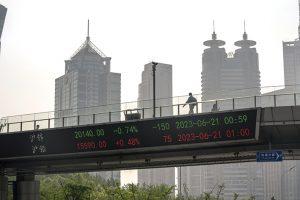BLOOMBERG
Stocks slumped with US equity futures as policy tightening fears from the US to Norway to the UK hobbled the market’s bull run. All industry subsectors fell into the red in Europe, where the region’s main equity gauge fell 1%, extending declines to a fourth day.
Contracts for the S&P 500 and Nasdaq 100 pointed lower following a selloff on Wall Street on hawkish warnings by Federal Reserve Chair Jerome Powell in testimony to Congress.
Their battle with inflation far from over, central banks across the world are wielding more rate increases and thwarting bets that tightening cycles were set to wind down. That’s prompted investors to rethink animal spirits unleashed by last week’s Fed rate pause.
“Recession risks are arguably higher if rates are higher for longer, but risk assets are not reflecting that,†said Janet Mui, head of market analysis at RBC Brewin Dolphin. “Markets are re-assessing whether further risk taking is justified after the year-to-date-rally.â€
In the US, hard-landing fears re-established themselves amid the prospect of tighter policy, pushing the inversion of a key segment of the Treasury yield curve to a full percentage point for the first time since March. Powell underscored the need to tame inflation during his semi-annual report to Congress, saying two more rate hikes this year was “a pretty good guess.†His warning preceded the policy meetings in England, Switzerland, Norway and Turkey.
The Bank of England (BOE) is under pressure to contain inflation after a report showed it rose by 8.7%, higher than expected for a fourth month. Money market pricing now implies the BOE’s benchmark will reach 6% by the end of the year, which would be the highest since the turn of the century.
Norway’s central bank lifted its key deposit rate by 50 basis points to 3.75%, the 11th hike in its benchmark since September 2021. Officials said the rate will “most likely be raised further in August†and forecast a peak rate of 4.25% later this year.
“We’re seeing increasing worries that central banks will look through concerns over a slowdown in economic activity and prioritise the battle against inflation, treating a possible recession as a necessary side-effect of their willingness to push inflation back down,†said Michael Hewson, chief market analyst at CMC Markets UK. By contrast, the Swiss National Bank delivered the smallest interest-rate hike since it began monetary tightening a year ago, lifting its key rate by a quarter-point to 1.75%. Swiss inflation is the slowest of any advanced economy.
 The Gulf Time Newspaper One of the finest business newspapers in the UAE brought to you by our professional writers and editors.
The Gulf Time Newspaper One of the finest business newspapers in the UAE brought to you by our professional writers and editors.
